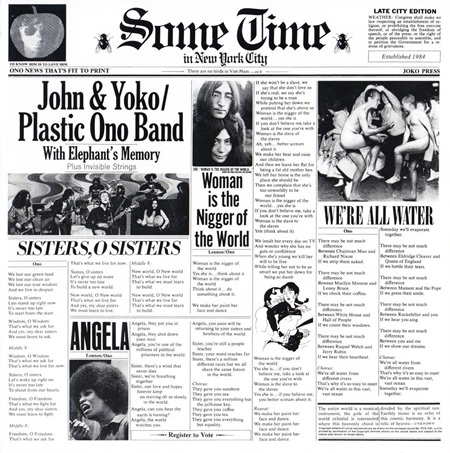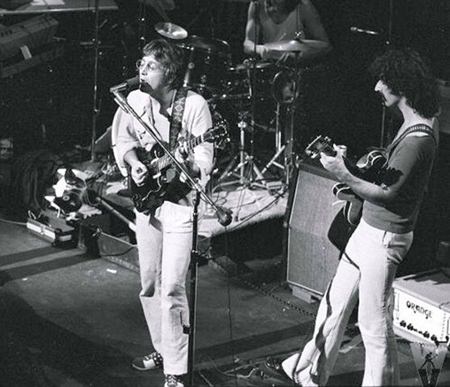
John Lennon & Yoko Ono: Some Time In New York City (Apple)
How devastating was Yoko Ono to John Lennon the artist and musician? This album, released six months after “Imagine”, answers that question. Has any famous artist dismantled himself more thoroughly? “Wings Wild Life” is a masterpiece compared to this turkey.
“Some Time In New York City” collects all Lennon’s weaknesses in one place. He always had a tendency to cut corners – Lennon was not a man who immersed himself if he could avoid it, he was lazy, he was restless, he snatched ideas and acted. Instant revolution, instant peace, instant karma. He was dependent on resistance, and found the perfect match in Paul McCartney, his partner during the early and mid- Beatles years. But Yoko Ono offered no resistance, she derailed him, oiled the soles of his shoes and sent him sliding towards the abyss.
One could approach the album as a deliberately chosen side road, a one-off, which it luckily turned out to be, but I am not so sure that it was the original plan. The hostile critics and lackluster sales figures actually took John by surprise. He sincerely thought he’d made a classic. He couldn’t see straight. Lennon was new to New York, he fell for all the tricks. Suddenly he had loads of friends, they carried him triumphantly on their shoulders straight into the left-wing underground society. It blinded him, it intoxicated him – and Yoko was the stoker on this locomotive to disaster.
Lennon was not aware of the fact that the American extreme left had more in common with P.T. Barnum than with the political philosophers that the European left wing students derived their ideas from. In the United States it was all show biz and Lennon was used for all his worth. Intoxicated by his own overblown self-concept and a group of seedy, dope smoking yes-men who wanted his money, his fame, his media coverage, he let himself be carried away. The only one that could have put the foot down and who actually knew New York, was Yoko, but she was a complete Barnum number herself.

“Some Time In New York City” is an agitation album from a mock-angry Lennon dressed up as a spokesperson. He liked to be a spokesman. It’s not wise when you can’t be bothered with doing some research of your own, but rather base everything on advisers. Lennon’s advisers were Yoko Ono, David Peel, Abbie Hoffman and Jerry Rubin. He could just as easily have allied himself with Black Pete and Magica De Spell.
Nearly all Lennon’s political songs are comic book fodder. The conflict in Northern Ireland gets two songs, churning songs with a message it’s not hard to identify with, except that the angriest of them is just noise peppered with lines that are a struggle to sing, while the other is a bittersweet dirge that could have gone somewhere if Lennon had put some more effort into the lyrics and blocked Yoko from polluting the song with her ghastly and trembling attempts at poetry in the bridges. All of Yoko’s contributions are terrible, and she hits rock bottom with the spine curling “We’re All Water”, a seven minute long definition of the word “horror”.
All is not bad, though. “Woman Is The Nigger Of The World” has strong Lennon vocals riding high in a mighty Phil Spector production; it’s powerful refrain aims for the stars, and though the lyrics are a bit too wordy, they are still both original and interesting. “John Sinclair” is a fascinating acoustic slide number that fell a bit on the side at the time as Sinclair already had been released from jail when the album was out. I also like Lennon’s rock’n’roll diary based on his first impressions of living in the Big Apple: “New Yok City” (though the similar “Meat City” on “Mind Games” is even better). There’s not much more.
If you found “Power To The People” flimsy, then “Some Time In New York City” is flimsy times ten. Clichés, worn phrases, comic book philosophy and some terrible Yoko Ono poetry stitched to tunes that sound disturbingly unfinished. What was John thinking? Inviting the totally charmless and mediocre band Elephant’s Memory into this sorry piece of plastic further underlines John Lennon’s lack of assessment ability. Elephant’s Memory does everything they can to emphasize how dreadful this project is.
Oh, but there is more: A bonus live album. One side devoted to some massive noise from the Lyceum, London in December 1969 when John & Yoko and an army of musicians performed “Cold Turkey” and, horror of horrors, an endless version of “Don’t Worry Kyoko”. The second side is devoted to John & Yoko gate crashing a concert with Frank Zappa and his Mothers. The couple’s efforts here are oppressive, and their treatment of the tapes afterwards on the verge of criminal. How could they put their own names on Zappa’s “King Kong” and rename it “Jamrag”? Search on Youtube, and you’ll see what Zappa thought about it.
Released: June 12, 1972
Produced by: John Lennon, Yoko Ono and Phil Spector
(All songs written by John Lennon and Yoko Ono, except where noted)
Side 1
“Woman Is the Nigger of the World” – 5:15
“Sisters, O Sisters” (Ono) – 3:46
“Attica State” – 2:54
“Born in a Prison” (Ono) – 4:03
“New York City” (Lennon) – 4:30
Side 2
“Sunday Bloody Sunday” – 5:00
“The Luck of the Irish” – 2:56
“John Sinclair” (Lennon) – 3:28
“Angela” – 4:06
“We’re All Water” (Ono) – 7:11
Side 3
Performed live at the Lyceum Ballroom in London, England on 15 December 1969, for a UNICEF charity concert
“Cold Turkey” (Lennon) – 8:35
“Don’t Worry Kyoko” (Ono) – 16:01
Side 4
Recorded live at the Fillmore East in New York City with Frank Zappa and The Mothers of Invention on 6 June 1971
“Well (Baby Please Don’t Go)” (Walter Ward) – 4:41
“Jamrag” (Lennon/Ono) – 5:36
“Scumbag” (Lennon/Ono/Frank Zappa) – 4:27
“Au” (Lennon/Ono) – 8:04
 |
 |
 |





